Reverse Osmosis & Water Treatment in Nigeria
CHUNKE projects of Reverse Osmosis Water Treatment in Nigeria including different types of water treatment systems.
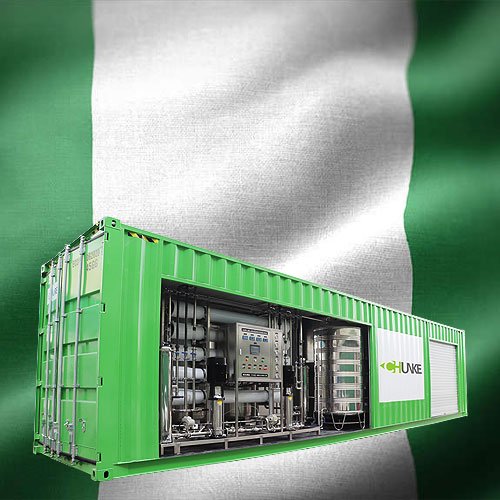
Nigeria, officially the Federal Republic of Nigeria, is a country in West Africa. It is situated between the Sahel to the north and the Gulf of Guinea to the south in the Atlantic Ocean accordingly. It covers an area of 923,769 square kilometres (356,669 sq mi), and with a population of over 230 million, it is the most populous country in Africa, and the world’s sixth-most populous country. Nigeria borders Niger in the north, Chad in the northeast, Cameroon in the east, and Benin in the west. Nigeria is a federal republic comprising 36 states and the Federal Capital Territory, where the capital, Abuja, is located. The largest city in Nigeria is Lagos, one of the largest metropolitan areas in the world and the second-largest in Africa.
Nigeria is a regional power in Africa and a middle and emerging power in international affairs. So, Nigeria’s economy is the largest in Africa, the 31st-largest in the world by nominal GDP, and 26th-largest by PPP. Nigeria is often referred to as the Giant of Africa owing to its large population and economy and is considered to be an emerging market by the World Bank.
However, the country ranks very low in the Human Development Index and remains one of the most corrupt nations in the world. Nigeria is a founding member of the African Union and a member of many international organizations, including the United Nations, the Commonwealth of Nations, NAM, the Economic Community of West African States, Organization of Islamic Cooperation and OPEC. It is also a member of the informal MINT group of countries and is one of the Next Eleven economies, accordingly.
Total renewable water resources in Nigeria
In 2020, renewable water resources per capita for Nigeria was 1,388.4 cubic meters per year. Between 1971 and 2020, renewable water resources per capita of Nigeria was declining at a moderating rate to shrink from 4,995 cubic meters per year in 1971 to 1,388.4 cubic meters per year in 2020, accordingly.
- Renewable surface water: 279.2 billion cubic meters per year
- Renewable groundwater: 87 billion cubic meters per year
- Renewable water resources: 286.2 billion cubic meters per year
- Dependency ratio: 22.8 %
Meanwhile, CHUNKE provides wide range of filtration and economical solutions based on the Nigeria’s water resources. So, our water treatment in Nigeria becomes more popular accordingl
- Surface water is water from river, lake which can be treated using different methods, such as Ultrafiltration Systems, Brackish Water RO accordingly.
- Desalination can be used for water from ocean, or sea source, which can be treated using Sea Water Reverse Osmosis Systems; Desalination Systems
- Ground Water or brackish water is from water located in the pore space of soil and rock “Borehole well”, which can be treated using Reverse Osmosis Systems, Borehole Water Filtration Systems, Well Water Filtration Systems, Chemical Dosing, UV Water Sterilizer accordingly.
- Government water supply, which could have high level of hardness or high level of chlorine, can be treated with Water Softener System, Media Water Filters.
Water Filtration Systems for Nigeria
Access to clean drinking water is a fundamental human right, yet many regions around the world, including Nigeria, struggle to provide their population with safe and potable water. So, in Nigeria, a country located in West Africa, the availability of water resources varies significantly across different regions. While Nigeria has abundant natural water sources, ensuring regular access to clean water remains a challenge. In recent years, the Nigerian government, in collaboration with various organizations, has initiated several water treatment projects to improve access to safe drinking water and address the sanitation crisis. One of the key technologies used in these projects is reverse osmosis (RO) water treatment systems. In this article, we will explore the significance of reverse osmosis water treatment in Nigeria and its role in providing safe and clean drinking water.
CHUNKE Projects of Water Treatment in Nigeria
Meanwhile, CHUNKE designs and produces water treatment systems that meet the World Health Organization requirements. So, our water treatment in Nigeria is suitable for drinking.
CHUNKE has over 15 years of experience as a global provider of B2B water treatment solutions for a variety of applications and industries, we offer a large selection of all types of reverse osmosis, ultrafiltration, electrodeionization and water treatment systems to meet your industrial needs accordingly. CHUNKE’s extensive global experience in engineering and manufacturing allows us to pre-engineer and customize water treatment and reverse osmosis systems to meet a wide range of customer requirements and specifications.
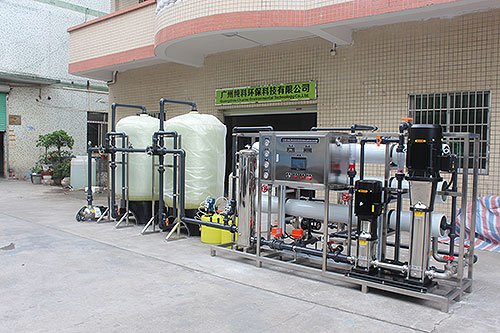
5000LPH Brackish Water Desalination System
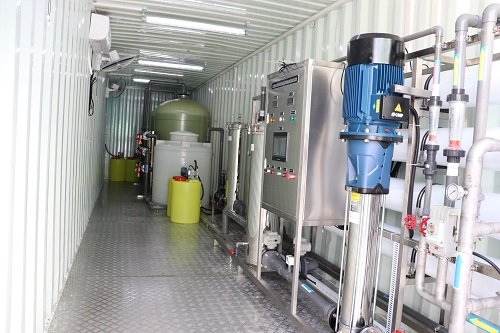
14TPH Containerized Reverse Osmosis System
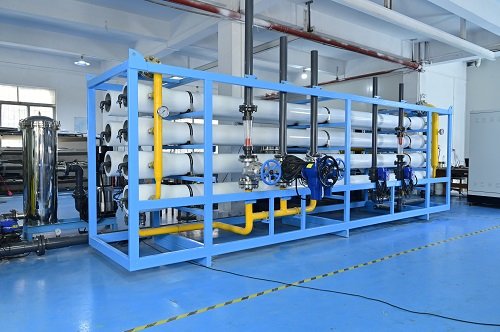
25TPH Reverse Osmosis System for Drinking
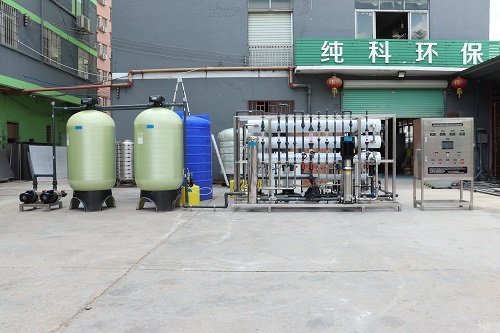
5000LPH RO Salt Water Purifier for Irrigation
The Role of Reverse Osmosis Water Treatment in Nigeria
Reverse osmosis (RO) is a water treatment technology that has gained significant popularity in Nigeria for its effectiveness in removing contaminants and producing clean and safe drinking water. Hence, RO systems utilize a semi-permeable membrane to remove impurities, such as bacteria, viruses, dissolved salts, and other contaminants from water. This process involves applying pressure to the water, forcing it through the membrane, and leaving behind impurities on one side while producing purified water on the other side accordingly.
RO systems have been widely used in various sectors in Nigeria, including residential, commercial, and industrial applications. In residential settings, RO systems are commonly used to purify drinking water, ensuring that households have access to clean and safe water. So, commercial establishments, such as hotels, restaurants, and offices, also benefit from RO systems by providing their customers with high-quality drinking water. In the industrial sector, RO systems are utilized for various purposes, including manufacturing processes, pharmaceutical production, and food and beverage processing.
Applications of Reverse Osmosis Water Treatment
Drinking Water Purification
One of the primary applications of reverse osmosis water treatment in Nigeria is the purification of drinking water. So, RO systems effectively remove contaminants, such as bacteria, viruses, heavy metals, and dissolved solids, ensuring that the water meets the highest standards of safety and quality. This is particularly crucial in regions where access to clean drinking water is limited, and the risk of waterborne diseases is high accordingly. By implementing RO systems, communities and households can have access to safe and potable drinking water.
Hence, these RO systems for brackish water treatment utilize high-pressure pumps to force water through semi-permeable membranes, effectively removing dissolved solids, salts, and other impurities. So, the treated water can then be used for various purposes, including drinking, irrigation, and industrial processes, accordingly.
Industrial Water Treatment
Reverse osmosis plays a vital role in the industrial sector in Nigeria, where water quality is of utmost importance in various manufacturing processes. Industries such as pharmaceuticals, food and beverage, and electronics rely on the use of high-quality water for their operations. So, RO systems effectively remove impurities and contaminants, ensuring that the water used in these industries meets the required standards. Meanwhile, this not only improves the quality of the final products but also enhances the overall efficiency of the manufacturing processes.
Irrigation and Agriculture
Agriculture is a significant sector in Nigeria, and ensuring access to clean and reliable water for irrigation is crucial for agricultural productivity. So, reverse osmosis water treatment systems can be used to treat brackish or saline water, making it suitable for irrigation purposes. By utilizing RO systems, farmers can maximize crop yields and reduce the risk of soil salinity, ultimately contributing to food security and sustainable agricultural practices.
Desalination of Seawater
In coastal areas of Nigeria where freshwater resources are scarce, desalination of seawater using reverse osmosis technology presents a sustainable solution. So, desalination systems remove the salt and impurities from seawater, making it suitable for various applications, including drinking water supply and industrial use. By harnessing the abundant seawater resources, communities in coastal regions can overcome the challenges posed by water scarcity and ensure access to clean water.
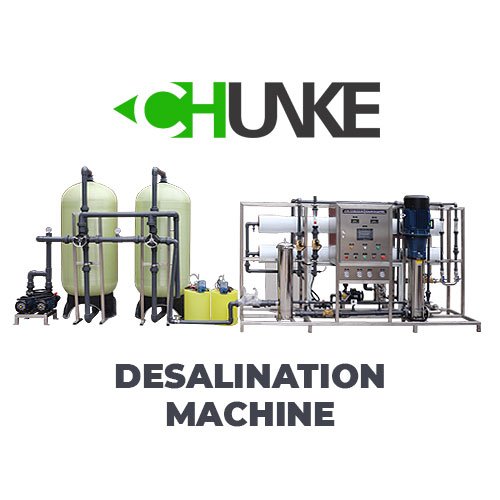
Initiatives and Projects in Nigeria
The Nigerian government, in collaboration with various organizations and international bodies, has undertaken several initiatives and projects to improve access to safe drinking water and address the water and sanitation crisis in the country. Meanwhile, these initiatives aim to leverage technologies like reverse osmosis water treatment systems to provide clean and potable water to communities across Nigeria, accordingly.
One such initiative is the Nigeria Sustainable Urban and Rural Water Supply, Sanitation and Hygiene (SURWASH) Program, which was approved by the World Bank in 2020, accordingly. Meanwhile, this program, funded by the International Development Association (IDA), aims to provide basic drinking water services to 6 million people and improved sanitation services to 1.4 million people. Also, the SURWASH Program focuses on improving water and sanitation facilities in schools and health centers, further contributing to improved public health outcomes, accordingly.
Additionally, the Nigerian government has launched the “Clean Nigeria: Use the Toilets” campaign to address the sanitation crisis and achieve an open defecation-free Nigeria by 2025. So, this campaign aims to raise awareness about the importance of proper sanitation practices and the need for hygienic toilet facilities. By improving sanitation practices, the campaign aims to prevent fecal contamination of water sources, ultimately contributing to the provision of clean and safe drinking water, accordingly.
Chunke is Trusted Water Treatment Supplier from China
In Nigeria, Chunke Water Treatment, a leading supplier of reverse osmosis systems from China, has been actively involved in providing water treatment solutions. With over 20 years of industry experience, Chunke Water Treatment offers a wide range of reverse osmosis and water treatment systems tailored to meet the specific needs of industries and communities in Nigeria.
Chunke Water Treatment’s expertise in producing high-quality reverse osmosis systems has contributed to improving water treatment capabilities in Nigeria. So, their reliable and efficient RO plants have been implemented in various projects across the country, ensuring access to clean and safe drinking water.
